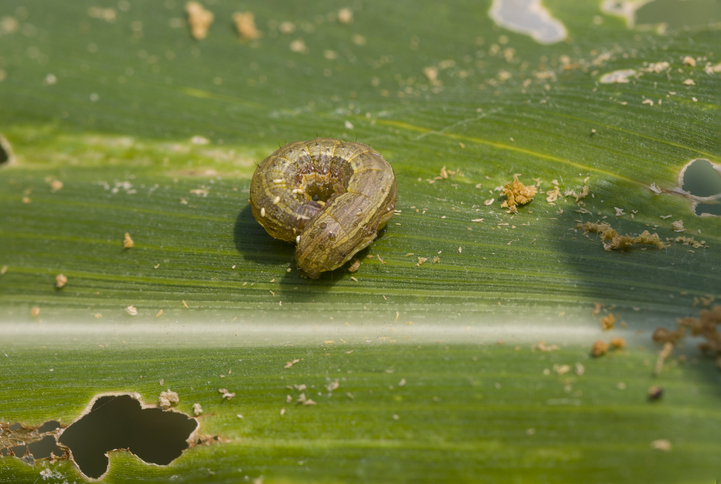
Fall armyworms are an outdoor pest prevalent in the late summer and early fall in Florida. They eat plants and grasses and can wreak havoc on your lawn. Like many insects, the armyworm looks different during different parts of its lifecycle. The key to combatting an armyworm problem is to recognize them quickly as pest control options work faster and better on younger larvae and heads off more severe damage. Here’s what you need to know about armyworms.
Armyworm Lifecycle
The armyworm starts life as a dome-shaped egg. Once hatched, the younger larvae start out with a black head. As the larvae mature, the head turns orange and the body turns brown while the worm takes on a Y shape. The adult version of the armyworm isn’t a worm at all but a moth. The moth has brown and gray wings with triangle shaped spots.
Armyworm Damage
Armyworms can cause a significant amount of damage to your yard, foliage and food plants. While they aren’t dangerous to humans, they are dangerous for your plants. They eat grasses, leaves and also attack certain types of foods you might grow in your garden or yard. Let’s look at how you can tell if you have armyworms.
- You see them. You might see armyworms in your grass or you might see them on leaves, snacking away.
- Your lawn develops bare spots. While they are active in the entire yard, they tend to target newer growth or areas that were heavily fertilized during the summer. This can result in bare spots in your lawn.
- Your leaves have holes in them. The leaves of the plants in your yard have holes in them caused by the armyworm eating the leaves.
- They attack your garden or fruit trees. If you grow a garden or have fruit trees in your yard, they will attack them and eat the leaves and fruits. Some of these food plants include strawberries, apples, papayas, peaches and corn.
What To Do When You Have An Armyworm Problem
Armyworms are active year-round but are most prevalent during the late summer and the fall in Florida. There are a few things you can do to help avoid armyworms or help stop them before they become a huge problem on your property.
- Don’t overfertilize your lawn. The extra fresh growth attracts armyworms.
- Harvest food early. If you can, harvest foods early and allow them to finish ripening in a protected location.
- Watch for the signs of an armyworm invasion. Watch for bare patches, holes in leaves and damage to food crops. Call your pest control company, Your Oasis Outdoor Care, right away if you see any of these signs.
The best way to deal with armyworms is to try to avoid allowing them to infest your yard. Keep up with your routine outdoor pest control service, and watch for the signs so you can alert your pest control service at the first sign of an armyworm invasion. Your Oasis Outdoor Care is your weapon in the battle against armyworms and other invasive yard pests.




